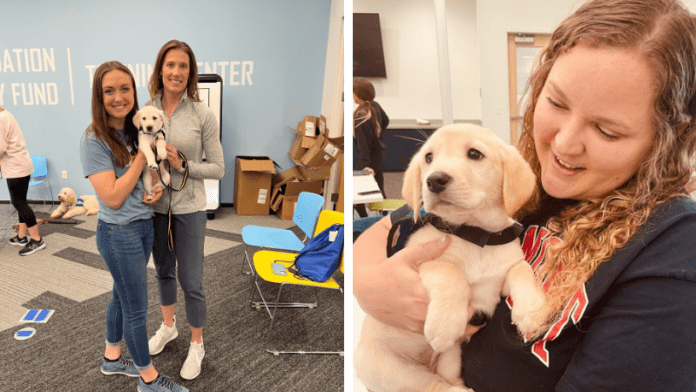This summer, a team of Belmont physical therapists helped raise a yellow Labrador retriever puppy for a local service dog organization. The team of puppy raisers began working with the future service dog at eight weeks old. Throughout the summer, they trained the puppy on basic commands and house training and introduced her to as many new people and places as possible.
The team of physical therapists included Belmont alumna Dr. Amanda Stephens (‘20), Associate Professor Dr. Christi Williams, alumna Dr. Ashley O’Brien (‘20) and current student Emily Haddox. They were joined by local physical therapists Holly Cauthen from Vanderbilt Pi Beta Phi and Susan Rohleder.
Williams includes service animals in her physical therapy curriculum at Belmont and hopes to increase that material in the future. “Service dogs are something that all health care providers need to learn more about. It’s becoming very common now and understanding rights of access is so important,” said Williams. “From a physical therapy standpoint, we work with patients all the time who have disabilities. Knowing more about service dogs can help us as providers teach patients about how dogs can assist them in managing their disability and gaining more independence.”
After the puppy reached four months old, she transitioned to a prison training program and is being trained throughout the week by inmates. On the weekends, the puppy goes out into the community with other volunteers to further develop skills in various environments and with various people. The puppy training program lasts nearly two years. In the final stages of training–between 14 and 20 months–the puppy will be trained to assist with greater mobility and medical alert tasks, such as retrieving medications, operating a public restroom and household tasks.
Working with a team of students and health care providers offered an even greater benefit to the puppy, as she was exposed to so many more people and places, said Williams. “It’s incredibly rewarding and also an unbelievable amount of work. The dog has to be with someone around the clock and you can’t leave them home in a crate. It takes a team of people,” she explained.
Once the puppy is matched, she will be trained for scent and behavior responses for the person she’s matched with. Specialized training continues for four to six months with the dog graduating around 20 months old.
For more information about how you can get involved with a service dog organization, contact Dr. Williams at christi.williams@belmont.edu.



